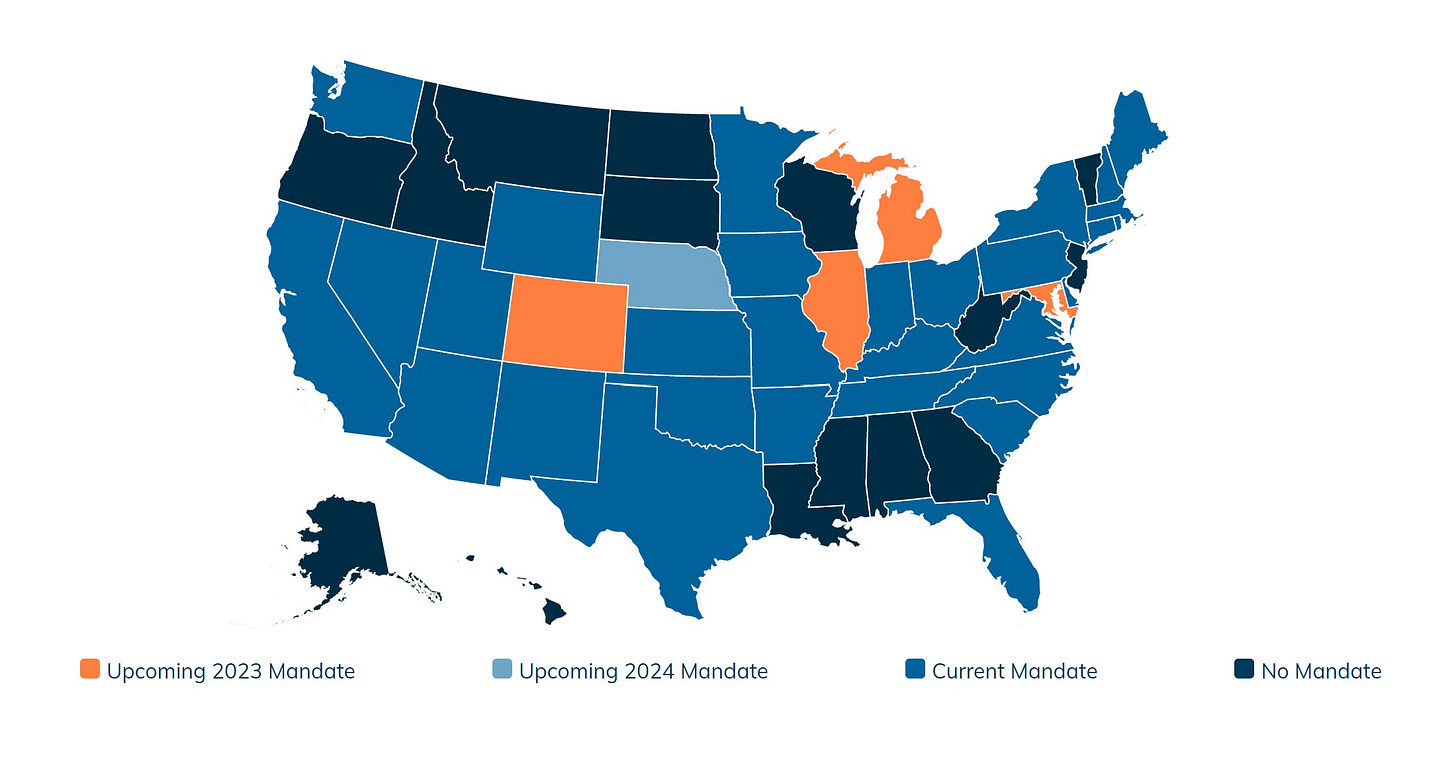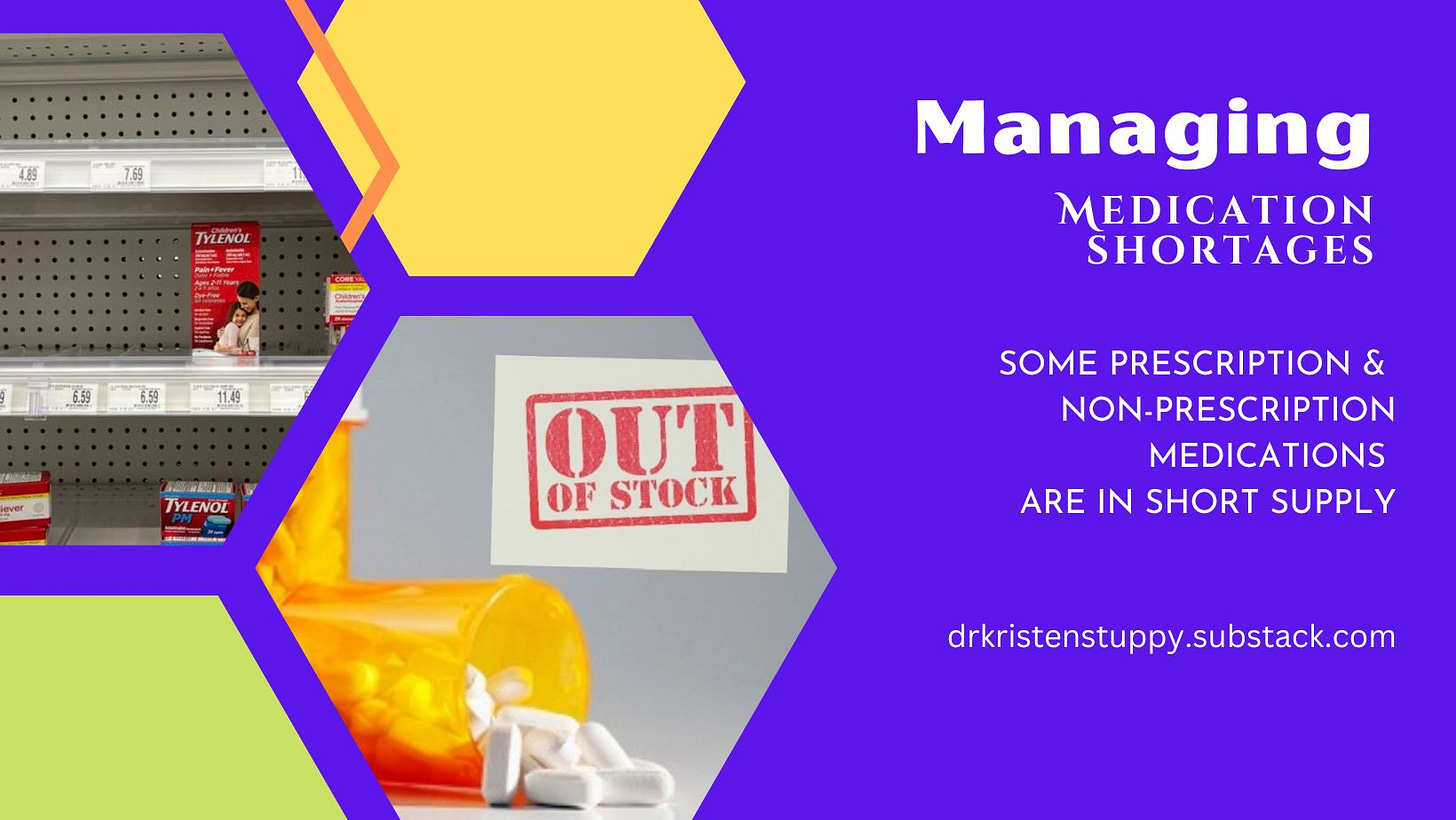For the past several weeks it’s been more and more difficult for people to find the medicines they need. Finding a medicine in your time of need is hard, but there are some things you can do to avoid going without a needed medication.
Over-the-counter Medications
There are shortages of cold and cough medications due to the large number of people with respiratory infections.
The good news is honey has been shown to work better than cough medicines, so even when there’s not a shortage, I don’t recommend cough medicine. Use honey for children over a year of age through adults. (It is not safe to give honey to infants under 12 months.)
Saline can be used for nasal congestion at any age. Follow it with suction for kids too young to blow their nose. Nasal irrigations are great for kids and adults willing to do this. I like the information on Nasopure’s website on how to use nasal washes. Their “Library” has much more to learn about nasal washing too.
Humidify the air. Dry air makes congestion worse.
Fever reducers and pain relievers are another in short supply.
Generic (store) brands work as well as name brands, so feel confident buying one of the off label brands if that’s what’s available.
Both acetaminophen and ibuprofen are commonly used fever and pain relievers. If you cannot find one, use the other per age and weight recommendations. If you are not sure of the dose, dosing information is often found on your pediatrician’s website. If not, ask your pharmacist before you make the purchase to be sure it is appropriate for your child. Older kids may be able to take naproxen - again, ask your pharmacist before purchasing to be sure it is appropriate for them if they are outside the dosing range on the package.
If the liquid version is not available, you can substitute a chewable for kids who can chew the tablets (not infants). Ask your pharmacist if you can use a chewable for your infant by dissolving it in a liquid.
If both chewable and liquids are out of stock, look at the dose in mg that your child needs, and see if an adult version would be appropriate for your adolescent or older child.
Remember that not all fevers need to be treated with medication. We use fever reducers for comfort, not to bring a temperature to normal. If your child is not fussy despite having a fever, it is okay to not use medication.
Call a friend or family member if you cannot find medicine but need it. They may be able to spare a couple of doses or know where it is in stock.
Don’t hoard. If you have several bottles in your medicine cabinet that means several families don’t have any. Please buy what you need, but not more than that.
Prescription Medications
If you or someone in your family takes a medication regularly, don’t wait until the last minute to fill it. This can be tricky with controlled substances, such as most ADHD medications, but fill it as early as possible based on last fill date, even if you missed a day or two over the month so you aren’t quite running out yet.
When your pharmacy says they don’t have the medication and can’t get it before you run out at home, ask if another in their chain has it (if applicable). CVS, Walgreens, and other chains can often tell you if a nearby location has the medication in stock. For non-controlled prescriptions they can move the script to the other location. For controlled prescriptions you will have to ask your prescriber to void the script at the initial location and send another to the location that has it in stock. If you aren’t using a chain, you will need to call around to try to find it. Be sure you know the medication name, strength, and dose when calling.
Ask your prescriber to give paper prescriptions when possible. This allows you to try several pharmacies without needing your prescriber to void and re-send scripts. Paper prescriptions are not allowed for controlled substances in most states, as pictured below, due to the national electronic prescribing of controlled substances (EPCS) laws.

Image source: https://www.rxnt.com/epcs-mandates/ If your pharmacy doesn’t have the specific medication ordered, ask if they have anything that could be substituted with a new prescription. For example, amoxicillin comes in many strengths. If your prescriber wrote for 400mg/5ml but the pharmacy only has the 250mg/5ml, your prescriber could change the prescription to allow it to be filled.
If you’re filling a prescription that is used regularly, see if a mail order pharmacy can fill it if your local pharmacy is out of stock.
Do not use antibiotics for viral infections. They don’t work for this purpose and may lead to side effects rather than benefits. During these shortages if you take them that means someone else who has a need for an antibiotic due to a bacterial infection may suffer due to inaccessibility.
ADHD medications in particular have been in short supply.
In general long acting medicines are preferred to short acting by many people, so they are harder to find. If you cannot find your long acting (once a day) medication, ask if the short acting version is available. For example if you or your child takes Adderall XR (extended release) 10 mg, ask if they have adderall IR (immediate release) 5mg. You would need to take the IR version in the morning and mid-day, so in addition to a new prescription, your child would need a school medication note for the nurse (or other designated staff) to give the medicine at school.
Some people can use a different medication in the same family of the medicine they are on. Unfortunately, some people are very sensitive and this doesn’t work, but if you cannot find your medicine, ask if there’s a similar one that may be substituted. This will require a titration to find the right dose, but it may be the only option at some point.
Ask if there’s a different version of the medication you or your child is on. Vyvanse, for example, is available as a capsule or chewable. Other medications come as a liquid. Even if this isn’t your preference, you can make a different version work until your preferred version is available.
Reduce need & use non-medication options
Regular exercise, healthy diet, and sufficient sleep help every body and condition. This isn’t the answer for best control, but it helps you in so many ways, it’s worth doing all three - and most of us lack in at least one category. Self care is always a good thing!
For anyone with a chronic disease that requires prescription medication, also use other measures to regulate your condition.
ADHD is best managed with stimulants for most people, but accommodations can help not only school children, but college students and adults as well.
Talk to your prescriber about non-prescription options for your specific condition.
It goes without saying, the best medicine is prevention. When illness rates are high, use preventative measures to avoid the need for fever reducers and cold medicines.
Well fitted quality masks work and can safely be worn by most children and adults. Remember that some viruses, like COVID, can linger in rooms for quite a while. Do not remove your mask and replace it only when people are nearby. The air you breathe is shared with others when you’re not properly masked, even if people have left the area. Learn more about finding the best masks on Clean Air Crew.
Get vaccinated and boosted for all the vaccine preventable diseases you can. This includes the standard vaccines (polio and measles have popped up here and there over the years) as well as flu and COVID vaccines. Vaccines help prevent serious illness if you get infected. They work and they’re safer than not getting vaccinated. This has been shown time and again. Anyone who tells you otherwise is misinformed. Period.
Stay home and away from others as much as possible when you’re sick. Remember that you might show mild symptoms, but if you give the virus to someone else they can get very sick or die. Please don’t do this to other people. Be kind and don’t share your infection. Don’t kill anyone or underestimate your ability to do so with your minor appearing illness. If you must be around others (whether at home or work) wear a quality mask at all times. When you return to regular activities, wear a quality mask. This can help prevent you giving others your infection if you’re still contagious and help you not get sick while your immune system is still recovering from your infection.
Use testing wisely. COVID home testing is available (and the cost is reimbursed by most insurance companies). Testing before being around others unmasked can help limit risk (but not entirely avoid it because testing too early might miss an infection). Test to determine when it’s safe to leave isolation when you’ve been infected - studies show we tend to be contagious much longer than the 5 day recommended isolation period.
Wash hands and surfaces frequently.
Ventilate and filtrate the air. Go outdoors when possible.
Avoid large groups and gatherings when rates are high. This doesn’t mean you can never do these things. Choose wisely when to go and when to skip events based on your risk tolerance, importance of the gathering (school is a type of large group gathering that is important) and local conditions or use other mitigations (such as pre-event testing, post-event testing and wearing masks) if you attend events.
Life is stressful and adding complications like medication shortages adds to the stress tremendously.
Practice self care.
Make time for sleep and exercise.
Listen to music to relax.
Meditate.
Journal.
Watch a funny short video.
Be thankful of what is going right in your life.
Tell yourself positive things you need to hear. Focus on what you can control versus what you can’t control.
Trouble shoot the issues and put problems in perspective.
We are all dealing with a lot and if you feel overwhelmed, find a professional to help. 988 is the US National Suicide Prevention Lifeline. Use it if needed.
This post is not about stress management, but it is so very important. See also 6 tips to de-stress.
Update!
Editing to add this news clip. Of course, of all the great information shared, they only chose a brief sentence or two from each of us interviewed, but we’re trying to spread the news. KSHB: Overland Park family speaks on importance, necessity of ADHD medication amid nationwide shortage






